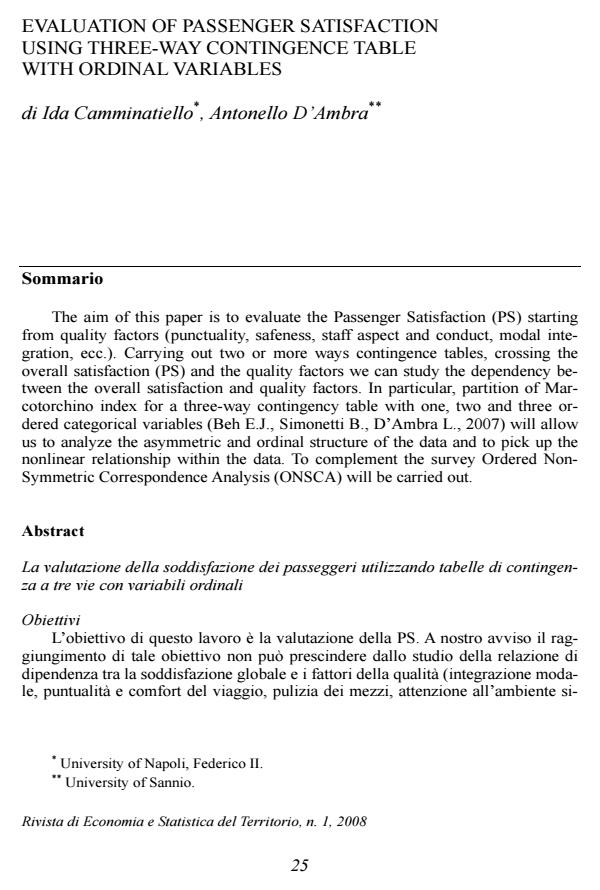Evaluation of Passenger Satisfaction using three-way contingence table with ordinal variables
Titolo Rivista RIVISTA DI ECONOMIA E STATISTICA DEL TERRITORIO
Autori/Curatori Ida Camminatiello, Antonello D’Ambra
Anno di pubblicazione 2008 Fascicolo 2008/1 Lingua Italiano
Numero pagine 14 P. 25-38 Dimensione file 240 KB
DOI
Il DOI è il codice a barre della proprietà intellettuale: per saperne di più
clicca qui
Qui sotto puoi vedere in anteprima la prima pagina di questo articolo.
Se questo articolo ti interessa, lo puoi acquistare (e scaricare in formato pdf) seguendo le facili indicazioni per acquistare il download credit. Acquista Download Credits per scaricare questo Articolo in formato PDF

FrancoAngeli è membro della Publishers International Linking Association, Inc (PILA)associazione indipendente e non profit per facilitare (attraverso i servizi tecnologici implementati da CrossRef.org) l’accesso degli studiosi ai contenuti digitali nelle pubblicazioni professionali e scientifiche
Evaluation of Passenger Satisfaction using three-way contingence table with ordinal variables ABSTRACT: Multivariate Statistical tools for Customer Satisfaction in the Great Distribution Objectives The aim of this work is to elaborate Customer Satisfaction (CS) data through a multivariate statistical methodology. Detailed data from various sources (questionnaires, phone interviews, direct inquires, etc.) were used to infer informations about their buying habits, diet and eventual brand loyalties. Methods and Results All data are collected by Customer Satisfaction tests performed in different Conad supermarkets. These collected data, was elaborated with a duplex method: by analysis and comparison of the results of each interview. Providing that the Principal Component Analysis with CS variables is not satisfactory, we decided to use a Simple Component Analysis by RV coefficient (SCA-RV), to increase the interpretability of the data, although losing some property. The second methodology used is the Structural Equation Model (Sem) in which the aim is to represent some process. In fact, such methodology yields a representation of the processes considering that the process can be analyzed by latent variables estimated, each formed by a set of manifest variables which act on satisfaction and the relationships among the several variables. Conclusions From these data we obtained that the Customers agree with the decision of the company, they express positive opinion of the employers but at the same time they are unsatisfied about the special offering in different departments of the store.;
Ida Camminatiello, Antonello D’Ambra, Evaluation of Passenger Satisfaction using three-way contingence table with ordinal variables in "RIVISTA DI ECONOMIA E STATISTICA DEL TERRITORIO" 1/2008, pp 25-38, DOI: